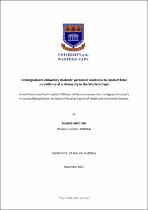Undergraduate midwifery students’ perceived readiness to conduct fetal surveillance at a University in the Western Cape
Abstract
Fetal surveillance (FS) helps midwives to predict the well-being of the fetus during labour and its relationship with uterine contractions as labour progresses. Incorrect use of surveillance apparatus and wrong interpretation of data from electronic fetal heart rate monitoring have been identified as contributing factors to delayed interventions that might have prevented the development of hypoxic-ischemic encephalopathy, which is the fifth largest cause of death of children under five globally.

